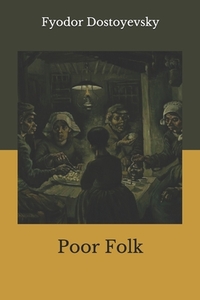Take a photo of a barcode or cover
Acho que o objectivo principal de começar a ler Dostoiévski foi alcançado: não mais temo o russo mais imponente da literatura, que me assombra desde os meus 15 anos. Foi uma leitura acessível e gostei. As personagens encaixaram-se num perfil em que me é impossível não apreciá-las. Mas, esperava mais. Bem sei que é o primeiro romance do autor, e ele só tinha a minha idade quando o escreveu (também não sei se a tradução que eu li é a mais fiel ao livro original, foi o que se conseguiu arranjar), mas sempre ouvi dizer tantas maravilhas do Dostoi (ultimamente tenho preferido Dostô) que fiquei ligeiramente desapontada. Hei-de continuar a lê-lo e certamente que irei ver a sua evolução à medida que for chegando aos calhamaços mais conhecidos. Quanto à história em si, o autor descreve o dia-a-dia de duas pessoas pobres através das suas cartas. Pobres, sem dinheiro, em casas alugadas deploráveis, com frio constante, sem o que vestir, com pouco que comer, em constantes desgraças; porém, têem-se um ao outro e amam-se profundamente sem que a pobreza (ou a diferença de idades e os boatos consequentes) destrua essa ligação. O fim da história é muito triste e reconta a eterna lenda de que o azar não tem fim. Fiquei na dúvida se esse amor entre os dois era puramente filial ou se algo mais se mantinha escondido, na profundeza de ambos, uma vez que a diferença de idades era uma coisa séria na época (ainda hoje o é, não é verdade). E será escusado dizer que sofri bastante com o que eles descrevem do seu quotidiano, porque nada têm e nada conseguiram ter.
(Livro lido para o projecto #dostôesselindo.)
(Livro lido para o projecto #dostôesselindo.)
dark
emotional
sad
slow-paced
Plot or Character Driven:
Plot
Strong character development:
No
Loveable characters:
Yes
Diverse cast of characters:
No
Flaws of characters a main focus:
No
"يا يمامتي، يا بنيتي، يا ماتوشكا…"
يذهب بنا دوستوفيسكي مرة اخرى عبر رواياته إلى فقراء ومضطهدين بطرسبرج، ويشع الضوء على حياة الكثير من اللذين لا تهتم معضم الروايات (خصوصًا في ذلك الزمان) أن تقص قصصهم.
الرواية مملة قليلًا، ويمتد وصف شعور واحد لعدة صفحات، ولكن بشكل عام الرواية جيدة.
يذهب بنا دوستوفيسكي مرة اخرى عبر رواياته إلى فقراء ومضطهدين بطرسبرج، ويشع الضوء على حياة الكثير من اللذين لا تهتم معضم الروايات (خصوصًا في ذلك الزمان) أن تقص قصصهم.
الرواية مملة قليلًا، ويمتد وصف شعور واحد لعدة صفحات، ولكن بشكل عام الرواية جيدة.
emotional
sad
dark
sad
slow-paced
Plot or Character Driven:
A mix
Strong character development:
Yes
Loveable characters:
No
Diverse cast of characters:
No
Flaws of characters a main focus:
Complicated
Sometimes the writing style really sang but my god was the overall narrative deeeeeeepressing.
Graphic: Death
Moderate: Alcoholism, Chronic illness, Mental illness, Misogyny, Suicidal thoughts, Grief, Death of parent, Classism
Minor: Child death, Sexual harassment
dark
sad
medium-paced
Plot or Character Driven:
Character
Strong character development:
No
Loveable characters:
Yes
Diverse cast of characters:
No
Flaws of characters a main focus:
Yes
Όπως κάθε βιβλίο του Ντοστογιέφσκι, έτσι και αυτό, ήταν καλό. Δεν έχω να πω και πολλά. Το μόνο που δε μου άρεσε ήταν η δομή του, μια συνεχής ανταλλαγή επιστολών, ενός ερωτευμένου ζευγαριού που σπάνια είχε άλλη επαφή πέρα από ένα γράμμα, ίσως βέβαια και να ήταν ένας λόγος που έδωσε μια πιο έντονη δραματική διάσταση στο έργο, αυτή που έχουμε συνηθίσει από τον τεράστιο αυτόν αγαπημένο συγγραφέα.
Written as letters between Makar and Barbara, one an old man, the other a pretty young orphan with terrible health, this is a pretty short book.
And it can be prety well summed up by this:
"My dearest, darling Barbara, I sleep in the room in the kitchen, because it's smaller and taxes less upon my money— so I can have tea and sugar every day! I'm sending you some bonbons through Thedora."
"Dearest Makar, HOW could you send me these bonbons, when you are living in the kitchen! You are sacrificing yourself for me, and it's not necessary."
Later:
"Dearest Barbara, I have aches in all my body and I'm very very poor, but don't trouble yourself about me, because I'm sending you some material, or some money, or some bonbons. Wrap yourself up tightly before you go out. Have you read so-and-so? He's absolutely fascinating."
"Dearest Makar," Barbara will reply, "You really MUSTN'T. Just because I get sick from walking out in the slightest damp is no reason for you to buy me bonbons. I know you can't even feed yourself, and your toes are coming out of your shoes, but you cannot continue to sacrifice yourself for me! So-and-so is absolute nonsense."
Of course, there's actually a plot— Barbara is being pursued by Anna Thedorovna, persecuted by young and old men, etc. Makar is constantly losing favor at the office.
Everything turns out alright, but… it seems they're actually happier being poor but 'together,'
That said, there are noble sentiments in the work. It's an apt description of poverty, and the story of Gorshkev is heart-breaking. Because of that, it's two stars, instead of one.
And it can be prety well summed up by this:
"My dearest, darling Barbara, I sleep in the room in the kitchen, because it's smaller and taxes less upon my money— so I can have tea and sugar every day! I'm sending you some bonbons through Thedora."
"Dearest Makar, HOW could you send me these bonbons, when you are living in the kitchen! You are sacrificing yourself for me, and it's not necessary."
Later:
"Dearest Barbara, I have aches in all my body and I'm very very poor, but don't trouble yourself about me, because I'm sending you some material, or some money, or some bonbons. Wrap yourself up tightly before you go out. Have you read so-and-so? He's absolutely fascinating."
"Dearest Makar," Barbara will reply, "You really MUSTN'T. Just because I get sick from walking out in the slightest damp is no reason for you to buy me bonbons. I know you can't even feed yourself, and your toes are coming out of your shoes, but you cannot continue to sacrifice yourself for me! So-and-so is absolute nonsense."
Of course, there's actually a plot— Barbara is being pursued by Anna Thedorovna, persecuted by young and old men, etc. Makar is constantly losing favor at the office.
Everything turns out alright, but… it seems they're actually happier being poor but 'together,'
Spoiler
because, at the end, when suddenly they have money, both of them seem to realize that they're going to be apart for the rest of their lives, and then OH! The crocodile tears!That said, there are noble sentiments in the work. It's an apt description of poverty, and the story of Gorshkev is heart-breaking. Because of that, it's two stars, instead of one.
This will go down as the book I read on my Kindle while I tried to rock my newborn baby to sleep. Perhaps a weird choice. I recall reading Grimm's Fairy Tales while holding my first child, though I think I read some of those out loud, perhaps scarring her for life. Also, not necessarily a wise choice as Dostoyevsky is not a fast-paced author. So at 3:30 in the morning while I am half-awake, trying to get a baby to sleep but needing to keep awake so I don't drop the baby, would Dostoyevsky make my eyelids droop. Surprisingly, if Dostoyevsky ever wrote a fast-paced page-turner, this just might be it.
Poor Folk was his first book, written before his time in prison. The psychological depth of his later books such as Brothers Karamazov and Crime and Punishment is not visible yet. Instead we get an epistolary novel, a story told through the letters between two lonely, poor people. It is beautifully written and well worth your time. If you've never read Dostoyevsky, this might be a good place to start.
Poor Folk was his first book, written before his time in prison. The psychological depth of his later books such as Brothers Karamazov and Crime and Punishment is not visible yet. Instead we get an epistolary novel, a story told through the letters between two lonely, poor people. It is beautifully written and well worth your time. If you've never read Dostoyevsky, this might be a good place to start.
emotional
reflective
fast-paced






